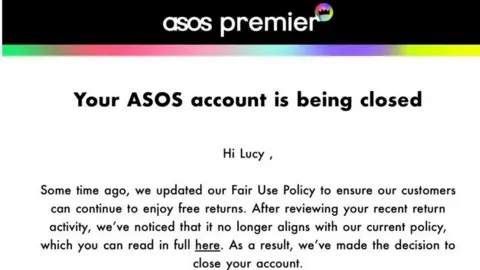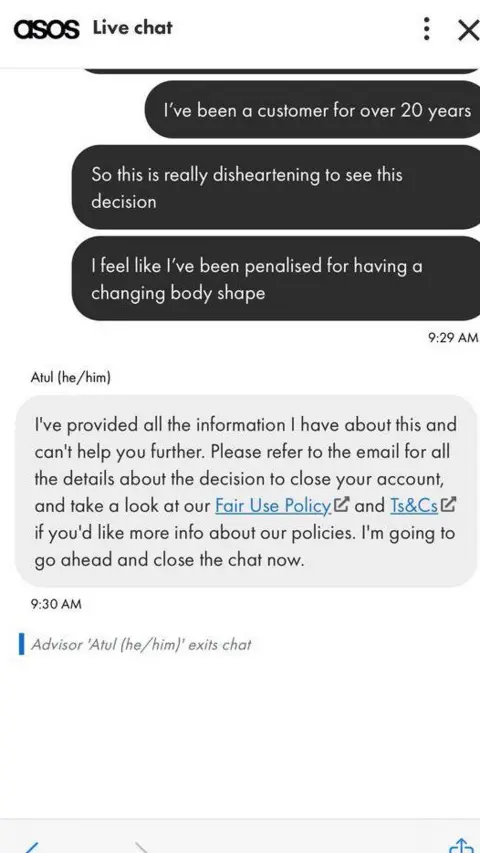BBC News
 BBC
BBCASOS shoppers expressed their anger after their accounts were shut down to return too many orders.
Some customers recently received an email informing them that they were allegedly violated the online fashion giant’s fair use policy.
It comes after last year when customers frequently return items and order and maintain items under £40, they began charging a controversial £3.95 commission.
In a statement, ASOS told the BBC:
“This helps us maintain our commitment to providing free returns to all customers across all core markets.”
ASOS’ fair use policy says it could shut down accounts with “abnormal or suspicious activity.”
Retailers first warned customers in 2019 that they could deactivate accounts that would display such patterns, but customers say a more stringent crackdown began last week.
Lucy Britnell, Teesside’s confessional “Shopaholic,” pays the best ASOS account payments since 2018 and offers free delivery to customers, but is currently prohibited.

“I probably spend at least £100 a month with ASOS. My latest holiday shop (over some orders) was £500,” she says.
“In most cases, you need to order two sizes. Then you return a size that doesn’t fit. ASOS sizing, especially your own brand, is very unpredictable.”
In an email Thursday, ASOS told Lucy: “After reviewing recent returns activities, I realized it was not consistent with current policies.”
It closed her account in 30 days and said the ban would apply to new accounts she opened.
On the same day, she received an Instagram request from ASOS and asked for permission to repost a photo of the ASOS outfit she was wearing on her account.
“It was a real slap on the face. I thought it was a joke at first,” she says.
“Even if they revive my account, I’ll take the money elsewhere,” says Lucy. “It really leaves a bad taste in my mouth.”

UK-based ASOS says it shipped 67.2 million orders worldwide last year.
Like its own line, it sells hundreds of other brands, and its website offers everything from low-priced clothing and vintage fashion to Korean skincare and Solde Janeiro.
Some customers have complained that they would be fired when they attempted to appeal the ban on their account.

Louise Gowley, from Glasgow, says she was “cut off” when she tried to raise a complaint about the live chat feature on the ASOS website.
“I tried again and asked how to complain about this and they told me the decision was final – and then they cut me off again for no reason,” the 27-year-old told the BBC.
Meanwhile, London’s PR director Frankie Allen, 32, said he has been an ASOS client for about 20 years.
After the recent ban, she tried to explain this through live chat, but the screenshot she saw on the BBC show, she was told she couldn’t do anything.
Such “robot communications” have changed the way people view the company and “allied many loyal customers,” Frankie argues.

However, she says she still understands why Assos is cracking down on returns.
“I know that some people abuse their policy because I tore jeans and clothes with jeans and clothes made from ASOS. I’ll wear clothes once, label them and return them for a refund,” she says.
This is a view backed up by some industry stakeholders, pointing to the delivery that will return the item to the warehouse and handle and inspect all damages being summed. The problems with inflation and freight have also become a challenge for fashion companies.
“Managing large quantities of returns is not just a sustainable model,” says Medi Parry-Williams, a retail expert. “In many cases, the £3.95 restocking fee is not close to covering these costs.”
That said, closing customer accounts was a “quite strict line” and ASOs didn’t underestimate it, says John Stevenson, a retail analyst at Peel Hunt.
Following the boom after profits since the Covid lockdown, some retailers have introduced fees to return items by mail or collection, including the next Zara, H&M, Uniqlo, and New Look.

A rather small thing was faced with a backlash when it began deactivating accounts that were said to have a high return rate last year. This policy came shortly after the introduction of a £1.99 fee for returns.
ASOS did not respond to further requests for comments from the BBC about the customer being banned. Some are now asking companies to change courses.
Broadcasting station and consultant Tskenya-Sarah Frazer has launched an online petition after she was banned from the site, seeking to stop “charging and punishment” for online return customers.
“As a plus size, tall, nervous individual, online shopping is my only option,” the 31-year-old tells the BBC.
“It’s absolutely essential that our customers can shop freely and return freely as high streets are shrinking, we are present and we have to shop more online.”

